上海外国语大学考研日汉互译真题2013
上海外国语大学mti英语翻译硕士考研真题
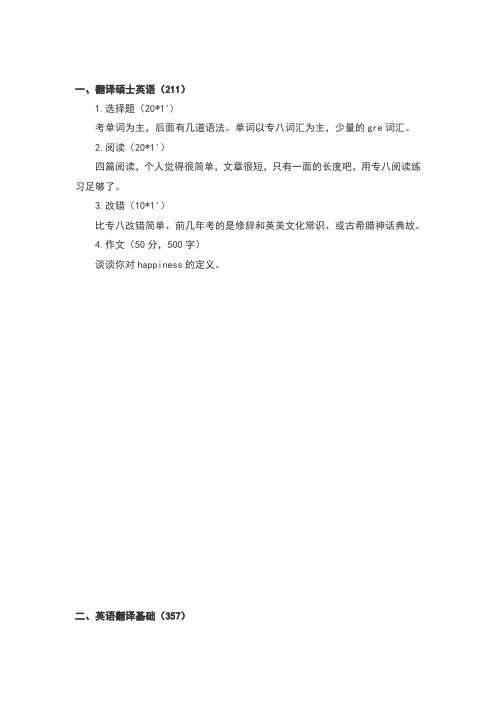
一、翻译硕士英语(211)1.选择题(20*1')考单词为主,后面有几道语法。
单词以专八词汇为主,少量的gre词汇。
2.阅读(20*1')四篇阅读,个人觉得很简单,文章很短,只有一面的长度吧,用专八阅读练习足够了。
3.改错(10*1')比专八改错简单、前几年考的是修辞和英美文化常识、或古希腊神话典故。
4.作文(50分,500字)谈谈你对happiness的定义。
二、英语翻译基础(357)1.英译汉(75分)该部分选取的是卢梭的《爱弥儿》(Emile, or On Education)部分文章,主要选自《爱弥儿》第三卷第一节。
全文1000多字,共11段,但题目只要求翻译划线部分,总计翻译872字,共6段。
完整原文如下:The whole course of man's life up to adolescence is a period of weakness; yet there comes a time during these early years when the child's strength overtakes the demands upon it, when the growing creature, though absolutely weak, is relatively strong. His needs are not fully developed and his present strength is more than enough for them. He would be a very feeble man, but he is a strong child.What is the cause of man's weakness? It is to be found in the disproportion between his strength and his desires. It is our passions that make us weak, for our natural strength is not enough for their satisfaction. To limit our desires comes to the same thing, therefore, as to increase our strength. When we can do more than we want, we have strength enough and to spare, we are really strong. This is the third stage of childhood, the stage with which I am about to deal. I still speak of childhood for want of a better word; for our scholar is approaching adolescence, though he has not yet reached the age of puberty.About twelve or thirteen the child's strength increases far more rapidly than his needs. The strongest and fiercest of the passions is still unknown, his physical development is still imperfect and seems to await the call of the will. He is scarcely aware of extremes of heat and cold and braves them with impunity. He needs no coat, his blood is warm; no spices, hunger is his sauce, no food comes amiss at this age; if he is sleepy he stretches himself on the ground and goes to sleep; he finds all he needs within his reach; he is not tormented by any imaginary wants; he cares nothing what others think; his desires are not beyond his grasp; not only is he self-sufficing, but for the first and last time in his life he has more strength than he needs.I know beforehand what you will say. You will not assert that the child has more needs than I attribute to him, but you will deny his strength. You forget that I am speaking of my own pupil, not of those puppets who walk with difficulty from one room to another, who toil indoors and carry bundles of paper. Manly strength, you say, appears only with manhood; the vital spirits, distilled in their proper vessels and spreading through the whole body, can alone make the muscles firm, sensitive, tense, and springy, can alone cause real strength. This is the philosophy of the study;I appeal to that of experience. In the country districts, I see big lads hoeing, digging, guiding the plough, filling the wine-cask, driving the cart, like their fathers; you would take them for grown men if their voices did not betray them. Even in our towns, iron-workers', tool makers', and blacksmiths' lads are almost as strong as their masters and would be scarcely less skilful had their training begun earlier. If there is a difference, and I do not deny that there is, it is, I repeat, much less than the difference between the stormy passions of the man and the few wants of the child. Moreover, it is not merely a question of bodily strength, but more especially of strength of mind, which reinforces and directs the bodily strength.This interval in which the strength of the individual is in excess of his wants is, as I have said, relatively though not absolutely the time of greatest strength. It is the most precious time in his life; it comes but once; it is very short, all too short, as you will see when you consider the importance of using it aright.He has, therefore, a surplus of strength and capacity which he will never have again. What use shall he make of it? He will strive to use it in tasks which will help at need. He will, so to speak, cast his present surplus into the storehouse of the future; the vigorous child will make provision for the feeble man; but he will not store his goods where thieves may break in, nor in barns which are not his own. To store them aright, they must be in the hands and the head, they must be stored within himself. This is the time for work, instruction, and inquiry. And note that this is no arbitrary choice of mine, it is the way of nature herself.Human intelligence is finite, and not only can no man know everything, he cannot even acquire all the scanty knowledge of others. Since the contrary of every false proposition is a truth, there are as many truths as falsehoods. We must, therefore, choose what to teach as well as when to teach it. Some of the information within our reach is false, some is useless, some merely serves to puff up its possessor. The small store which really contributes to our welfare alone deserves the study of a wise man, and therefore of a child whom one would have wise. He must know not merely what is, but what is useful.From this small stock we must also deduct those truths which require a full grown mind for their understanding, those which suppose a knowledge of man's relations to his fellow-men--a knowledge which no child can acquire; these things, although in themselves true, lead an inexperienced mind into mistakes with regard to other matters.We are now confined to a circle, small indeed compared with the whole of human thought, but this circle is still a vast sphere when measured by the child's mind. Dark places of the human understanding, what rash hand shall dare to raise your veil? What pitfalls does our so-called science prepare for the miserable child. Would you guide him along this dangerous path and draw the veil from the face of nature? Stay your hand. First make sure that neither he nor you will become dizzy. Beware of the specious charms of error and the intoxicating fumes of pride. Keep this truth ever before you--Ignorance never did any one any harm, error alone is fatal, and we do not lose our way through ignorance but through self-confidence.His progress in geometry may serve as a test and a true measure of the growth of his intelligence, but as soon as he can distinguish between what is useful and what is useless, much skill and discretion are required to lead him towards theoretical studies. For example, would you have him find a mean proportional between two lines, contrive that he should require to find a square equal to a given rectangle; if two mean proportionals are required, you must first contrive to interest him in the doubling of the cube. See how we are gradually approaching the moral ideas which distinguish between good and evil. Hitherto we have known no law but necessity, now we are considering what is useful; we shall soon come to what is fitting and right.Man's diverse powers are stirred by the same instinct. The bodily activity, which seeks an outlet for its energies, is succeeded by the mental activity which seeks for knowledge. Children are first restless, then curious; and this curiosity, rightly directed, is the means of development for the age with which we are dealing. Always distinguish between natural and acquired tendencies. There is a zeal for learning which has no other foundation than a wish to appear learned, and there is another which springs from man's natural curiosity about all things far or near which may affect himself. The innate desire for comfort and the impossibility of its complete satisfaction impel him to the endless search for fresh means of contributing to its satisfaction. This is the first principle of curiosity;a principle natural to the human heart, though its growth is proportional to the development of our feeling and knowledge. If a man of science were left on a desert island with his books and instruments and knowing that he must spend the rest of his life there, he would scarcely trouble himself about the solar system, the laws of attraction, or the differential calculus. He might never even open a book again; but he would never rest till he had explored the furthest corner of his island, however large it might be. Let us therefore omit from our early studies such knowledge as has no natural attraction for us, and confine ourselves to such things as instinct impels us to study.2.汉译英(75分)2016年11月5日,上海外国语大学首届“中国学的国际对话:方法与体系”国际研讨会在虹口校区高翻学院同传室拉开帷幕,本次学术研讨会由上外主办,中国学研究所协同国际关系与公共事务学院、高级翻译学院联合承办,欧盟研究中心、俄罗斯研究中心、英国研究中心、中日韩合作研究中心以及马克思主义学院共同参与。
2013上外研究生考试法语试卷
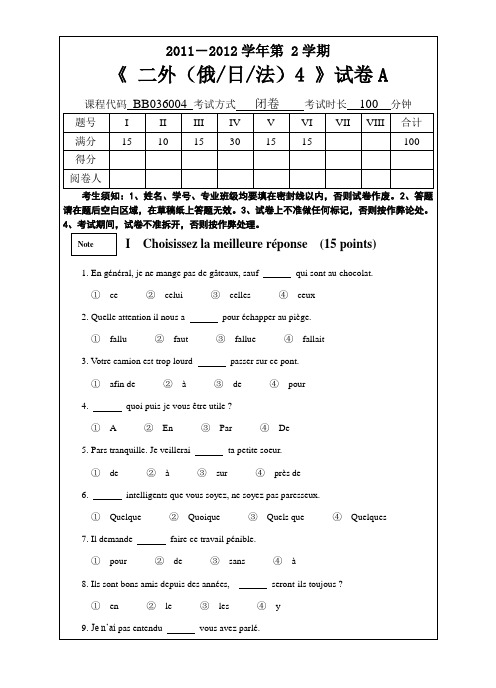
①fallu②faut③fallue④fallait
3. Votre camion est trop lourdpasser sur ce pont.
①afin de②à③de④pour
4.quoi puis-je vous être utile ?
①A②En③Par④De
5.Pars tranquille. Je veilleraita petite soeur.
ⅣCompréhension écrite(30points)
Texte1:une visite au poète
J’ai dit à Philippe :
-Nous allons voir un poète, M Ponge. M Ponge habite à Viresac. Le connaissez-vous ?
Choisissez la meilleure réponse (15points)
1.En général, je ne mange pas de gâteaux, saufqui sont au chocolat.
①ce② celui③celles④ceux
2.Quelle attention il nous apour échapper au piège.
4.Bien que M Ponge n’ait pas fait ses études secondaires, il a du talent pour la poésie.
2013年上海大学357英语翻译基础考研真题(回忆版)-复制
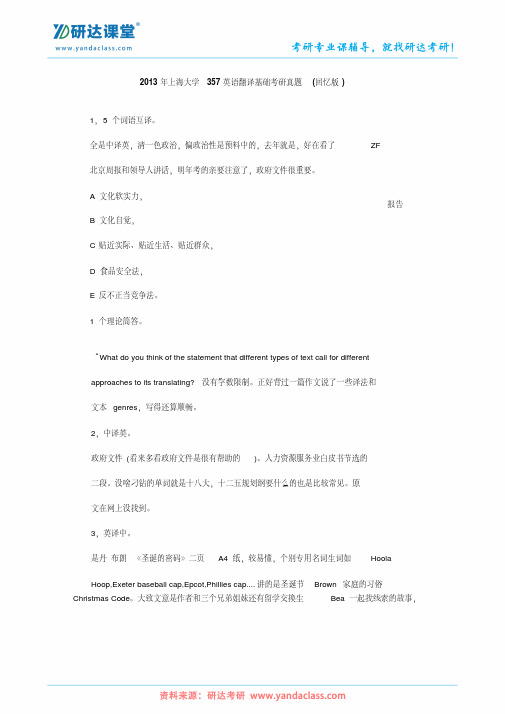
2013年上海大学357英语翻译基础考研真题(回忆版)1,5 个词语互译。
全是中译英,清一色政治,偏政治性是预料中的,去年就是,好在看了ZF 报告北京周报和领导人讲话,明年考的亲要注意了,政府文件很重要。
A 文化软实力,B 文化自觉,C 贴近实际、贴近生活、贴近群众,D 食品安全法,E 反不正当竞争法。
1 个理论简答。
“What do you think of the statement that different types of text call for differentapproaches to its translating?”没有字数限制。
正好背过一篇作文说了一些译法和文本genres ,写得还算顺畅。
2,中译英。
政府文件(看来多看政府文件是很有帮助的)。
人力资源服务业白皮书节选的二段。
没啥刁钻的单词就是十八大,十二五规划纲要什么的也是比较常见。
原文在网上没找到。
3,英译中。
是丹·布朗《圣诞的密码》二页A4 纸,较易懂,个别专用名词生词如HoolaHoop,Exeter baseball cap,Epcot,Phillies cap....讲的是圣诞节Brown 家庭的习俗Christmas Code 。
大致文意是作者和三个兄弟姐妹还有留学交换生Bea 一起找线索的故事,谜底就是EPCOT 五个字母,其实就是布朗父母给他们的礼物,那就是去Walt DisneyEpcot Center,大家都兴奋地手舞足蹈,最后就说这是最美好的一个圣诞节。
原文:Every family has its own holiday traditions. In the Brown household, Christmaswas always a time of delicious food, sing-alongs, colorful gifts, and mysterious codes.Yes, codes.When I was a kid, no Christmas morning was complete without the annual treasure hunt.When the last present under the Christmas tree had been opened, my siblings and I knew thatthere still remained one "big" present hidden somewhere in the house for us to find. Our onlyhope of locating it was a cryptic clue that traditionally resided in a lone envelope perched high onthe tree, out of our reach.One year the envelope contained a particularly mind-boggling treasure hunt that mybrother, sister and I still recall as The "TOCEP" Christmas Mystery. (In fact, this treasure huntdirectly inspired the scene on page 111 of The Da Vinci Code.)That was the year we had a foreign exchange student living with us. Bea wasSouth African and understandably was somewhat overwhelmed by the frenziedanticipation that led up to an American Christmas. Nonetheless, she embraced thedecorating, singing, and cooking with a zeal that made the holidays doubly special forus that year. So it was with great happiness, on Christmas morning, after all the presentswere opened, that my parents handed Bea the mysterious envelope and explained to her theBrown tradition of a Christmas Quest.Looking amazed that such a tradition could exist, Bea excitedly opened the envelope. Thepoem inside announced that this year's quest involved locating five letters of the alphabet, whichhad been hidden around the house. According to the poem’s final stanza, the first letter we needed to find was "T."You seek a letter in a nook(It's very hard to see).But of the places you might look,There’s just one spot for "T."Only one spot for T?My little brother Greg was the first to figure it out. He leapt up and dashed into the kitchen. We all ran after him as he retrieved a stool, dragged it into the breakfastnook, climbed up onto the counter, and grabbed the canister in which my mother kept her tea bags. Sure enough, inside was a note card emblazoned with the letter "T."Brilliant!Along with the letter "T" we found another clue, which ingeniously guided usdown to the basement where we found the letter "O" taped to an O-shaped HoolaHoop.Again, fiendishly clever!From there more clues led us all over the house. In the kitchen we found the letter"C" stuffed in a Vitamin C container. In the mud-room, the letter "E" was hiddeninside my Exeter baseball cap (bearing that same letter).By then, we had located four letters (T-O-C-E), and still we felt no closer tounderstanding our mysterious prize. We hoped the fifth and final letter would make it all come clear. The final clue, however, was baffling.The final letter in your quest,Is simple as can be.It's hidden in a special roomQuite natural for a "P."A special room quite natural for a P?I looked in the pantry around the canned peas. Nothing.My little brother checked his bedroom for his Phillies cap. Nothing.A natural place for "P"?It was Beatrice, our exchange student (having learned a good amount of American slang), who suddenly gasped, jumped to her feet, and dashed up the stairs. For a moment, my siblings and I thought she was ill... but then we heard her shriek with joy. We raced upstairs to find Beain the bathroom, laughing hysterically and pointing into the toilet. We peered inside, and there,to our enormous delight, we found the letter "P" taped inside the toilet bowl."P" in the toilet!The joke left all four of us kids rolling on the floor in hysterics. Surely my parentshad to be the two funniest people alive. Finally, when we all could breathe again, wehurried back to the living room to decipher the meaning of these five mysteriouslettersT-O-C-E-P?We spread the letters out on the living room floor and stared at them.T...O...C...E...P?They meant nothing to us.It was my younger sister Valerie who saw it first. She drew a startled breath andspun to my parents in disbelief. "No!" she exclaimed. "Really?"My parents were beaming. "Really. We leave tomorrow morning."The rest of us kids watched in rapt animation as little Valerie victoriously rearranged the five letters TOCEP.... to spell one magical word: EPCOT. Instantly, all four kids were dancing around the room, whooping for joy, chanting "Epcot! Epcot!" Even our exchange student Bea had heard of Walt Disney World's Epcot Center, and she joined in the dance. It was a dream come true. The very next morning, we allboarded a plane for Epcot.It was the best Christmas ever.。
上外 二外 考研 JP 13
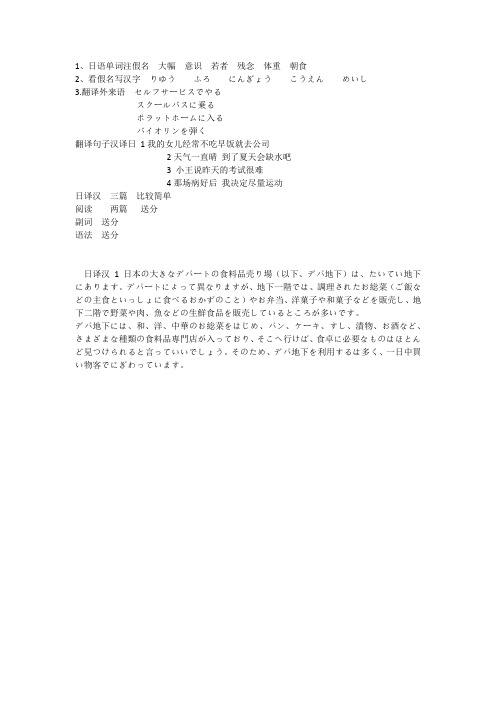
1、日语单词注假名大幅意识若者残念体重朝食
2、看假名写汉字りゆうふろにんぎょうこうえんめいし
3.翻译外来语セルフサービスでやる
スクールバスに乗る
ポラットホームに入る
バイオリンを弾く
翻译句子汉译日1我的女儿经常不吃早饭就去公司
2天气一直晴到了夏天会缺水吧
3 小王说昨天的考试很难
4那场病好后我决定尽量运动
日译汉三篇比较简单
阅读两篇送分
副词送分
语法送分
日译汉1 日本の大きなデパートの食料品売り場(以下、デパ地下)は、たいてい地下にあります。
デパートによって異なりますが、地下一階では、調理されたお総菜(ご飯などの主食といっしょに食べるおかずのこと)やお弁当、洋菓子や和菓子などを販売し、地下二階で野菜や肉、魚などの生鮮食品を販売しているところが多いです。
デパ地下には、和、洋、中華のお総菜をはじめ、パン、ケーキ、すし、漬物、お酒など、さまざまな種類の食料品専門店が入っており、そこへ行けば、食卓に必要なものはほとんど見つけられると言っていいでしょう。
そのため、デパ地下を利用するは多く、一日中買い物客でにぎわっています。
2013年上海对外贸易大学翻译硕士考研真题,真题答案,参考书目,招生人数,复试分数线,考研经验,导师简介
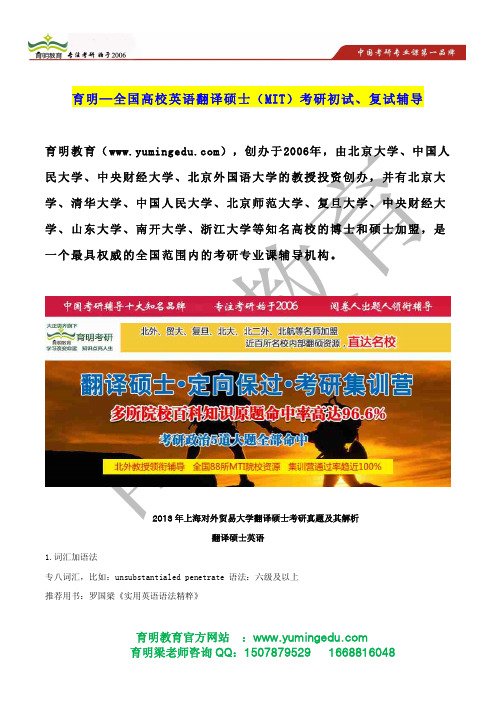
育明教育官方网站 :
育明梁老师咨询QQ :1507879529 1668816048
育明—全国高校英语翻译硕士(MIT)考研初试、复试辅导
育明教育(),创办于2006年,由北京大学、中国人民大学、中央财经大学、北京外国语大学的教授投资创办,并有北京大学、清华大学、中国人民大学、北京师范大学、复旦大学、中央财经大学、山东大学、南开大学、浙江大学等知名高校的博士和
硕士加盟,是一个最具权威的全国
范围内的考研专业课辅导机构。
2013年上海对外贸易大学翻译硕士考研真题及其解析
翻译硕士英语
1.词汇加语法
专八词汇,比如:unsubstantialed penetrate 语法:六级及以上
推荐用书:罗国梁《实用英语语法精粹》。
2013年上海外国语大学汉语国际教育考研状元笔记、历年真题、复习方案、三大法宝、状元经验交流、参考书
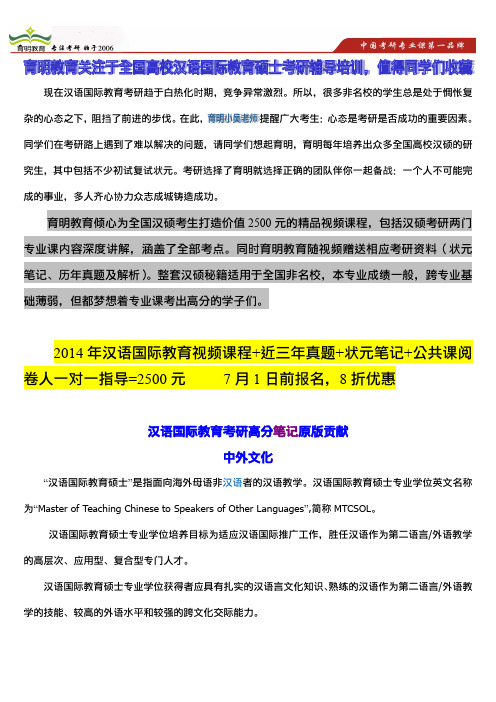
现在汉语国际教育考研趋于白热化时期,竞争异常激烈。
所以,很多非名校的学生总是处于惆怅复杂的心态之下,阻挡了前进的步伐。
在此,提醒广大考生:心态是考研是否成功的重要因素。
同学们在考研路上遇到了难以解决的问题,请同学们想起育明,育明每年培养出众多全国高校汉硕的研究生,其中包括不少初试复试状元。
考研选择了育明就选择正确的团队伴你一起备战:一个人不可能完成的事业,多人齐心协力众志成城铸造成功。
育明教育倾心为全国汉硕考生打造价值2500元的精品视频课程,包括汉硕考研两门专业课内容深度讲解,涵盖了全部考点。
同时育明教育随视频赠送相应考研资料(状元笔记、历年真题及解析)。
整套汉硕秘籍适用于全国非名校,本专业成绩一般,跨专业基础薄弱,但都梦想着专业课考出高分的学子们。
2014年汉语国际教育视频课程+近三年真题+状元笔记+公共课阅卷人一对一指导=2500元7月1日前报名,8折优惠汉语国际教育考研高分笔记原版贡献中外文化“汉语国际教育硕士”是指面向海外母语非汉语者的汉语教学。
汉语国际教育硕士专业学位英文名称为“Master of Teaching Chinese to Speakers of Other Languages”,简称MTCSOL。
汉语国际教育硕士专业学位培养目标为适应汉语国际推广工作,胜任汉语作为第二语言/外语教学的高层次、应用型、复合型专门人才。
汉语国际教育硕士专业学位获得者应具有扎实的汉语言文化知识、熟练的汉语作为第二语言/外语教学的技能、较高的外语水平和较强的跨文化交际能力。
提醒广大考生:考研专业课复习必须注意方法,正确的方法是学习效率的保障(1)要详细地充分掌握指定参考书所考知识点汉教考研三大法宝(2)搜索并整理详细的属于自己独有的笔记(3)结合历年真题抓住重点难点、常考点、必考点等知识点要详细地充分掌握指定参考书所考知识点专业基础综合科目考试是大学本科阶段专业基础课的综合考试,考试内容为进入研究生学习阶段所必备的专业基础知识、基本理论以及相应能力,侧重考查考生的基本素质、一般能力和学科基本素养。
2013年上海外国语大学考研翻硕MTI翻译基础真题回忆版分享
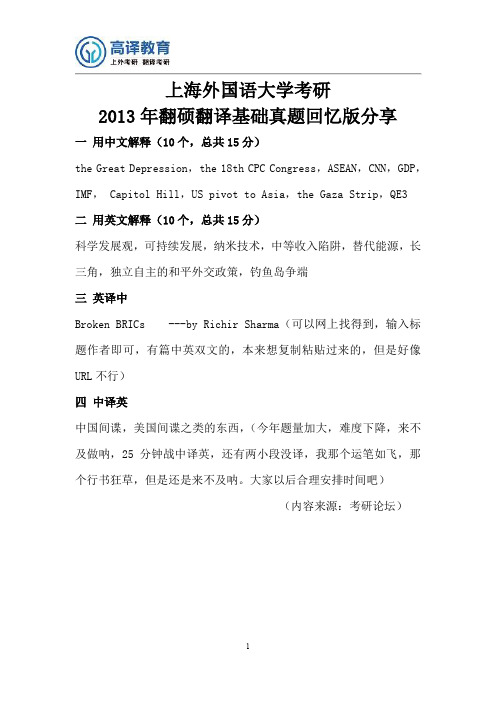
上海外国语大学考研
2013年翻硕翻译基础真题回忆版分享
一用中文解释(10个,总共15分)
the Great Depression,the 18th CPC Congress,ASEAN,CNN,GDP,IMF, Capitol Hill,US pivot to Asia,the Gaza Strip,QE3
二用英文解释(10个,总共15分)
科学发展观,可持续发展,纳米技术,中等收入陷阱,替代能源,长三角,独立自主的和平外交政策,钓鱼岛争端
三英译中
Broken BRICs ---by Richir Sharma(可以网上找得到,输入标题作者即可,有篇中英双文的,本来想复制粘贴过来的,但是好像URL不行)
四中译英
中国间谍,美国间谍之类的东西,(今年题量加大,难度下降,来不及做呐,25分钟战中译英,还有两小段没译,我那个运笔如飞,那个行书狂草,但是还是来不及呐。
大家以后合理安排时间吧)
(内容来源:考研论坛)
1。
高译教育-上海对外经贸大学考研英语翻译基础真题2013
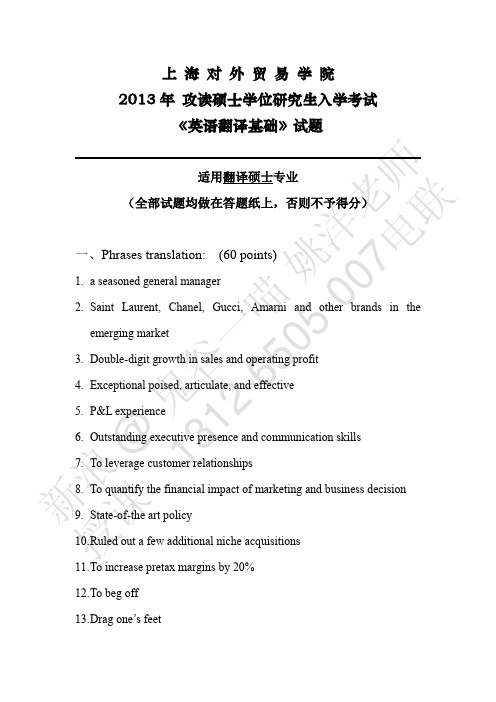
上 海 对 外 贸 易 学 院 2013年 攻读硕士学位研究生入学考试《英语翻译基础》试题适用翻译硕士专业(全部试题均做在答题纸上,否则不予得分)一、Phrases translation: (60 points)1. a seasoned general manager2. Saint Laurent, Chanel, Gucci, Amarni and other brands in the emerging market3. Double-digit growth in sales and operating profit4. Exceptional poised, articulate, and effective5. P&L experience6. Outstanding executive presence and communication skills7. To leverage customer relationships8. To quantify the financial impact of marketing and business decision 9. State-of-the art policy10. R uled out a few additional niche acquisitions11. T o increase pretax margins by 20%12. T o beg off 13. D rag one’s feet新浪 @ 鬼谷一喵 姚洋老师授课丗1312-6505-007电联14. E nough’s enough 15. F iduciary responsibility1. 行业知识丰富2. 极具合作精神,在跨部门项目中表现出色3. 获得极为正面的客户反馈4. 提升品牌质量和现场销售管理质量5. 自有品牌产品6. 负责3亿美元的产品业务7. 负责多个职能部门8. 组织一次全国销售会议9. 远见和个人魅力 10. 在风险重重的十字路口 11. 有创造力,出色的市场意识 12. 设定高绩效的标准13. 有号召力,能领导复杂项目14. 有机增长15. 担任更多的职务,增加业界间知名度二、Paragraphs translation: (90 points)1. Translate the following passage into Chinese :《Give respect and get performance 》新浪 @ 鬼谷一喵 姚洋老师授课丗1312-6505-007电联It sounds clichéd, but to get the best from your people, you have to showrespect for them. This can result in surprising decisions. There was a time when some people regarded workers in England as lazy and careless, but I recognized that England has a very strong appreciation of craftsmanship and tradition, so wepurchased a high-end footwear company, Church’s shoes. People in Italy thought this was crazy.Our first challenge was to decide what to do with the factories. Church’sowned a plant in the middle of Northampton that employed 600 people, and the smart move appeared to be to relocate it out of town, which would give us more space at less cost. But when I visited the factory, I saw that peopl e’s lives were organizedaround its location. Most employees lived nearby and would go home for lunch. If we moved them out of town, we’d be robbing them of an hour at home and forcing them to bring sandwiches to work. Their quality of life would be compromised, and they wouldn’t be getting anything in return. So we kept the factory in town.That decision has paid dividends. We retained nearly all the company’s veryhardworking and talented people, who have rewarded us with increased productivity. And we’ve proved a larger point: English workers are both cheaper and more industrious than Continental workers.You could say that work is about duties. People have a duty to work hardfor me, but I have a duty to respect them as individuals. Another duty I have is to help them learn. That’s a duty I owe to the company as well as to my employees, because a company whose managers take seriously the obligation to help their people improve will be a lot more competitive. Prada is rather good at developing talented employees. Many of our senior managers joined us as young people, and many of the people who have left us have gone on to launch successful businesses of their own.2. Translate the following passage into English :《重用年轻经理》我特别推崇年轻人。
